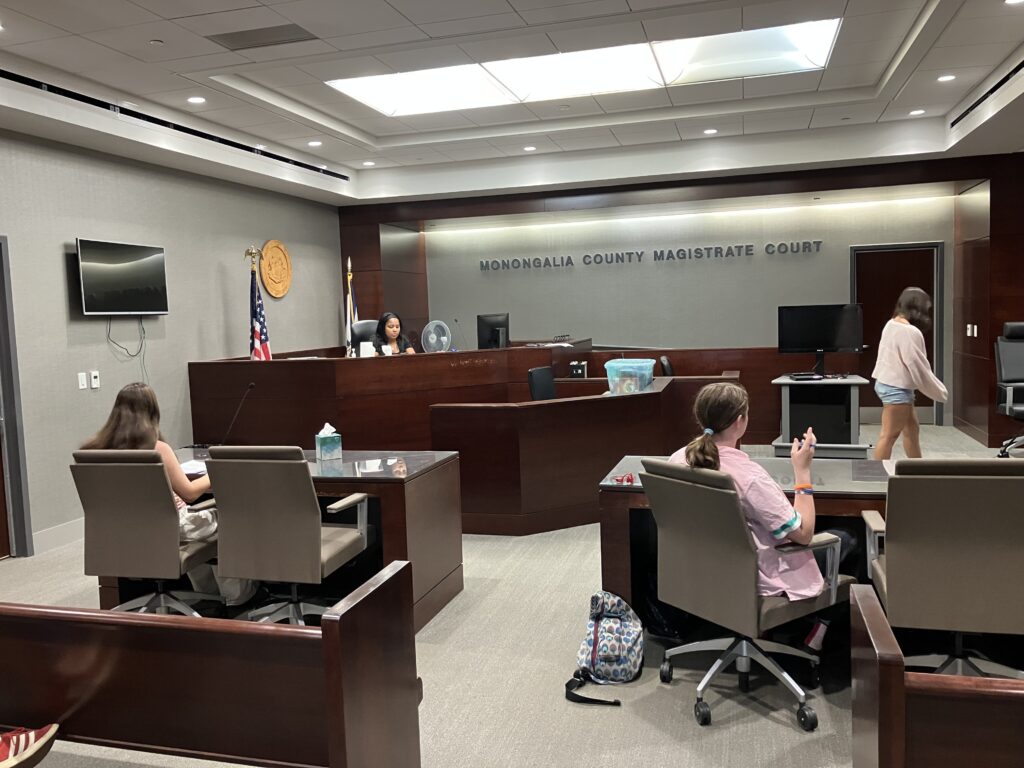In the criminal justice system, youth who are alleged to have committed an offense which would be considered a misdemeanor if committed by an adult can be referred to members of an elite squad known as the teen court.
On a recent Wednesday afternoon, like on most Wednesday afternoons, Adamantia Sierros stands up in a courtroom in the Monongalia County Justice Center to state her argument in front of a jury of her peers.
“We have had to adjudicate underage possession of alcohol, vaping, skipping school, the usual stuff,” Sierros said. Not really behavior-wise. It’s just typical teenager stuff that’s been going on.”
Sierros isn’t a lawyer, she’s a middle school student, although she would like to be a lawyer when she grows up. The teen court program allows her to get a realistic feel for the legal system.
Privacy policies prevented WVPB from attending an actual Teen Court session, so the day’s activity is an old-fashioned debate.
“We’re here for a debate session, and it’s about if you want to lower the drinking age to 18 or keep it at 21,” Sierros said.
The peers in the jury box are in fact other teens. For most of them, this isn’t just practice for a future career but a volunteering requirement as part of their sentences in teen court.
Teen court is a diversion program for first time youth offenders for infractions that would be considered misdemeanors if they were adults, minor cases such as underage possession of tobacco, underage possession of alcohol, shoplifting small amounts and truancy.
Alexyss Coles is the Monongalia County teen court coordinator. She chose the topic for today’s debate as a good exercise for her aspiring attorneys, but also because of its relevance to the teens in the jury box.
“They gave into peer pressure using the vapes and stuff, and then we’re using peer pressure to get them out of it,” she said.
According to the National Association Of Youth Courts, “positive peer pressure is used in youth courts to exert influence over adolescent behavior.”
Coles said advice and admonishment from adults about the issues the teen court addresses – truancy, underaged drinking, tobacco use – often fall on deaf ears.
“Hearing an adult tell you like, ‘Hey, you shouldn’t steal, Hey, you shouldn’t vape,’ is one thing,” she said. “Compared to other people your age telling you like, ‘Hey, it’s not cool. Hey, there’s better things you can do with your life, maybe that friend group that you’re in, you can get out of.’ Because they’ve had to do that with their friends as well. Just getting somebody else’s point of view in the same age group at the same school level, kind of makes a bigger difference.”
Teen court, also known as youth court, is a national initiative with more than 1,000 programs across the country. In West Virginia, 19 counties have implemented the program since 2006.
Coles said many of the participants do come in scared, or at the very least apprehensive. But she said they leave having learned a lesson, and most tell her they enjoy the program.
“I’ve had some people tell me, ‘Oh, like, I’d like to come back,’” she said. “We do have surveys that I’ve been sending out afterwards for the parent and the defendant to fill out once they complete their sentence. And everything’s been pretty positive. Everything’s been either good or excellent.”
Nicholas Moorhead is a probation officer in Monongalia County, and president of the Monongalia County teen court board of directors. He said the program helps lessen the caseload for an overburdened circuit court.
“Another reason I really love sending kids to teen court, it’s all about peer accountability,” Moorhead said. “Sometimes the kids can be tougher than the judge, which I think is really interesting. They could do a range of sanctions, from community service, writing letters, and they have to come back and serve as a juror on teen court.
Moorhead said due to the privacy requirements of dealing with underaged children, the juvenile system is opaque to the general public. As an example, Moorhead said that, although rare, if a petition is filed in circuit court, a young individual can be under court supervision until they’re 21 years old.
“Like any adult involved in the court process, it could be very stressful,” he said. “This gives kids the opportunity to do an alternative program, and, you know, be held accountable for a mistake they’ve made and move on.”
Moorhead credits the program for giving teens like Sierros an opportunity to learn about the legal system hands-on.
“I truly want any kid who has an interest in the criminal justice system to take advantage of this program. Anybody can come and volunteer at any time,” he said. “I want a high schooler, maybe going into college, looking to go into a criminal justice field. Now they can come here and they can get direct experience working as a teen prosecutor, teen attorney, juror, a bailiff, anything.”
Moorhead said in his experience, he doesn’t see the kids that go through the teen court program again. It’s effective, and he encourages more students to step up and volunteer to help their peers get on the right track.






















